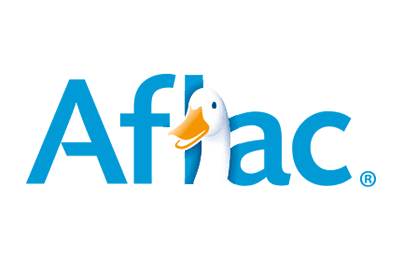
All On 4
Dental Implants
Culver City
“The first thing people notice about you is your smile.”
What are All On 4 dental implants?
The term All On 4 is an implant procedure used to rehabilitate patients suffering from tooth loss. The treatment technique consists of placing four implants in either the upper or lower jaw or both jaws if completely edentulous. These implants act as the support for a prosthetic set of teeth.
This procedure is used for patients with advanced gum disease, severe decay, or broken down teeth that have resulted in complete tooth loss in either the upper or lower arch, or both.
The procedure consists of placing four (4) dental implants. Two (2) implants are placed at an angle, usually 30 to 45 degrees from the biting surface, in the back or posterior area to help overcome any issues with anatomical structures or any bone deficiencies. Two straight implants are placed in the front.
The All On 4 technique utilizes the dense bone that is often found in the front part of the jaws. Placing the implants at an angle in the back of the jaw helps to maximize the implant’s bone contact. Care is taken to avoid sinus cavities in the upper jaw and the nerve canal in the lower jaw.

Once implants have been placed, a fixed prosthesis with 10 to 14 teeth is typically placed within 24 hours of surgery. Quite often, the prosthesis is placed at the time of surgery.
The All On 4 treatment then offers the replacement of missing teeth with a permanent dental prosthetic that is either a dental bridge or a denture. The prosthetic is meant to stay fixed in the mouth by being held in with dental implant screws. The bridge or denture can only be removed by a dentist.
The benefits of the All On 4 implant treatment are as follows:
- A cost-effective approach to full arch tooth replacement
- Missing teeth can be replaced the same day
- Function and look like natural teeth
- Underlying jawbone tissues are completely supported
- A better solution to poorly fitting dentures
- Chewing power is completely restored
- Improved overall quality of life and self-esteem
- An excellent option for those patients who do not have adequate bone density to support conventional implant therapies

To be considered for the All On 4 dental implant procedure, the dentist will evaluate the bone in the affected jaw. This is done using a cone-beam computed tomography (CBCT) scan, a machine like the image below.
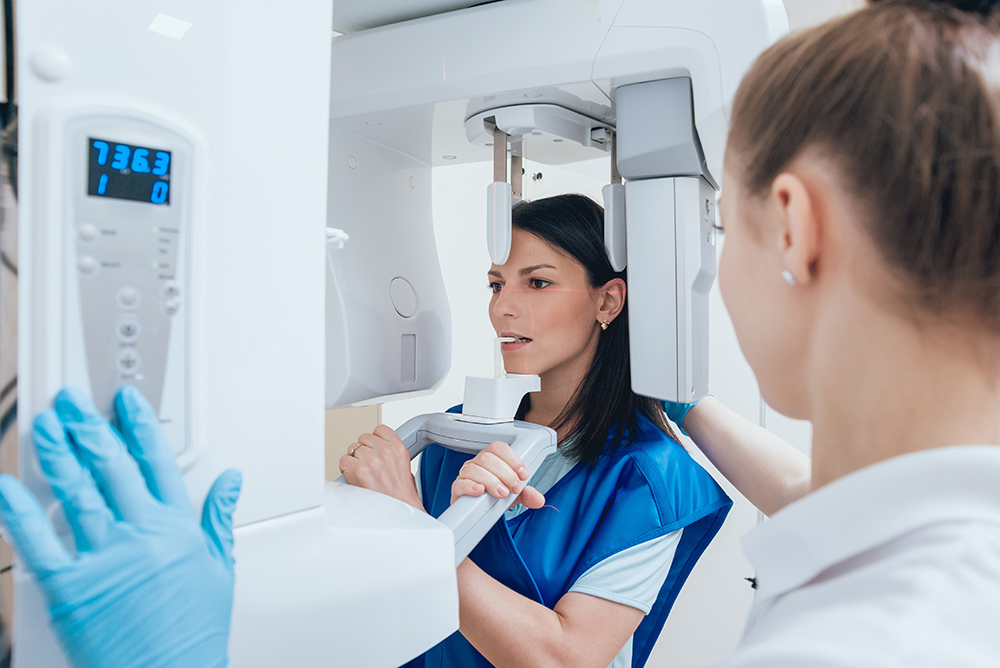
A CBCT scan will produce a three-dimensional image that is used to view detailed images of the mouth and jaw. CBCT scans can measure bone thickness, bone density, and bone depth and determine where these are in relation to your nerve canal and sinus cavities. This information can not be adequately determined through normal X-rays.
Expect the following during your CBCT scan:
- Unlike an MRI scan where you have to lie down and be placed inside the machine, a CBCT scan will require you to either sit or lay down, and the scanner will rotate around the head.
- The scanning process should take no more than a few minutes to complete
- You will need to remove any jewelry, hearing aids, hair clips, dentures, etc., prior to the scanning process.Once the CBCT scan has been completed, the best placement of the implants for your particular case is established.
How are All On 4 dental implants different from conventional dental implants?
Procedural Differences
Conventional dental implants are placed straight into the bone. When a person is undergoing traditional implant treatment, there is a need for bone grafting or sinus augmentation, or both. This is because adequate bone is needed to anchor traditional implants effectively into the jaw. With these added procedures, the jaw will need weeks or even months to heal before implants can be placed.
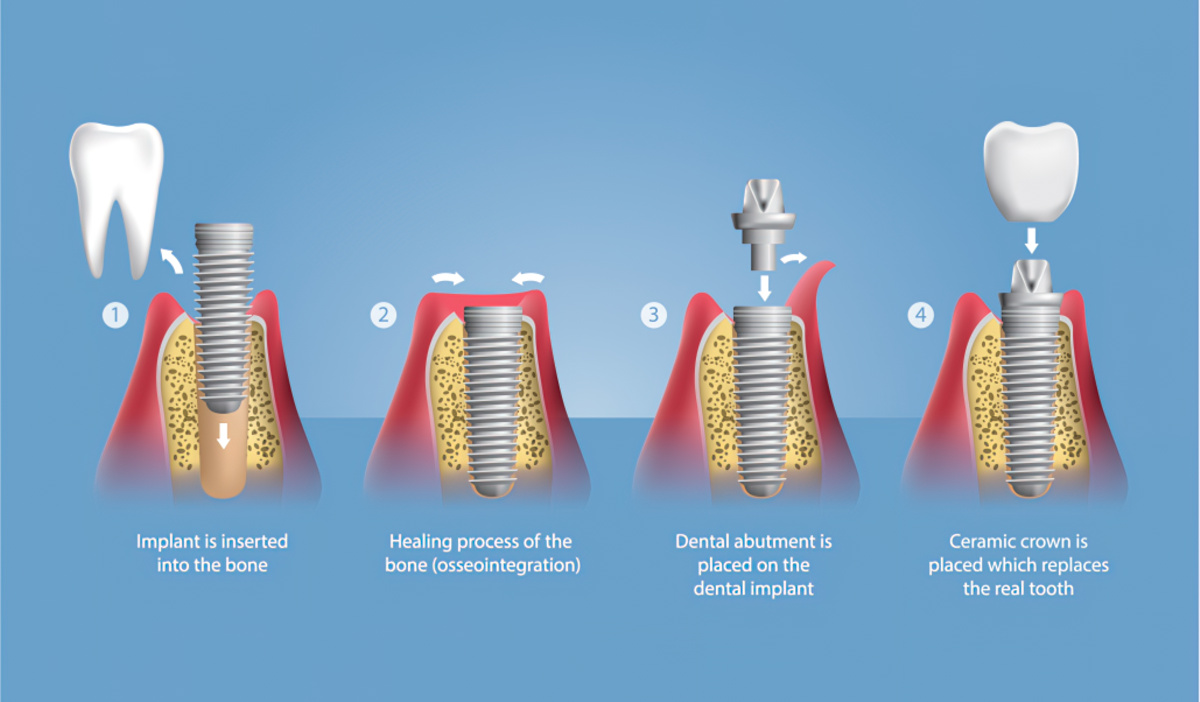
In contrast, the All On 4 dental implant procedure places four implants strategically to ensure maximum contact with the jaw bone. This is done by placing two implants at a 30 to 45-degree angle in the back of the jaw and placing the other two in the front of the jaw in the most bone-dense location. Through maximizing the implant’s contact with the jaw bone, the need for bone grafting is avoided.
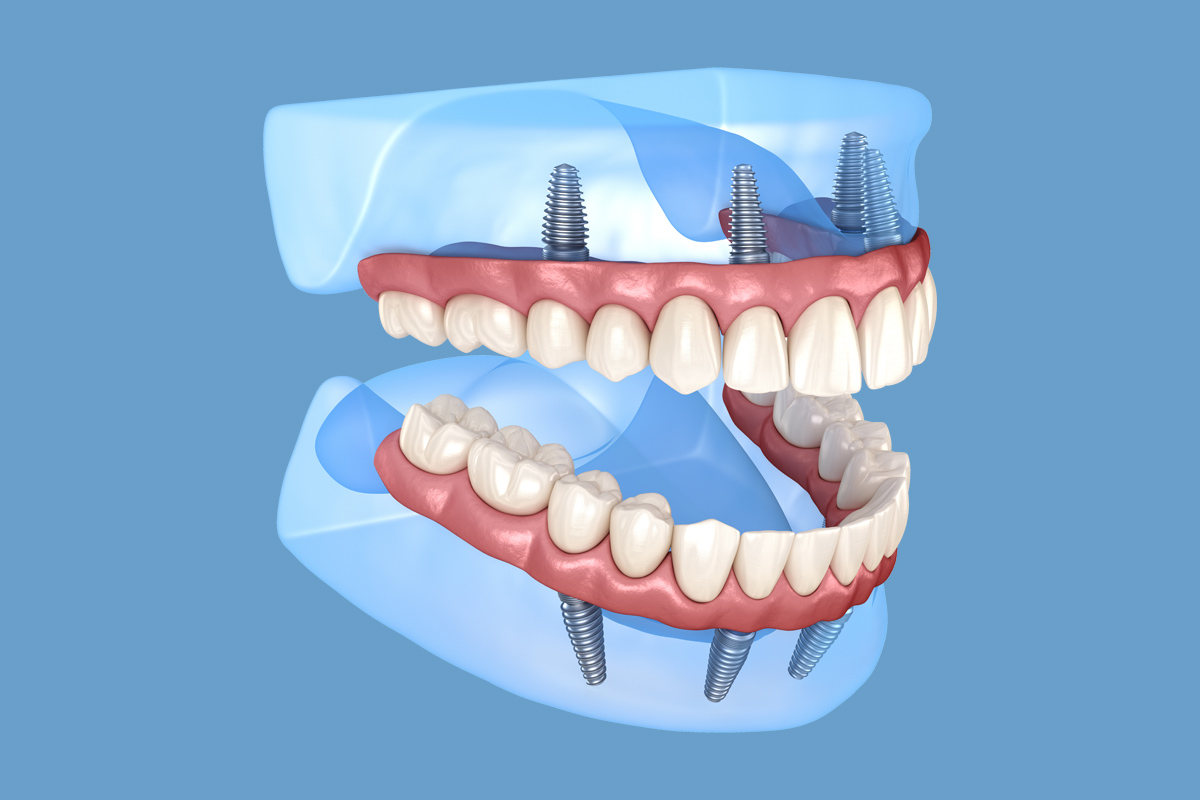
Length of Treatment
Conventional dental implant procedures usually take more time overall than All On 4 treatments. This is primarily due to conventional implant procedures requiring some bone grafting or sinus lifting treatments before the implant placement.
A dental bone graft is used to add density and volume to your jaw in the area where the implant is to be placed. There are various types of bone grafts, and they include the following:
- Autogenous – This is where bone graft material is taken from another area of your body.
- Allograft – The bone graft material is taken from a human tissue bank.
- Xenograft – The bone graft material is taken from an animal tissue bank.
- Alloplast – The bone graft material is synthetic
Once your type of bone graft material has been chosen, the bone graft is performed. Once completed, your body will begin the repair process. Your bone tissue will begin to regenerate, promoting bone growth. This process can take 4 to 6 months to properly heal and be ready for conventional implant placement.
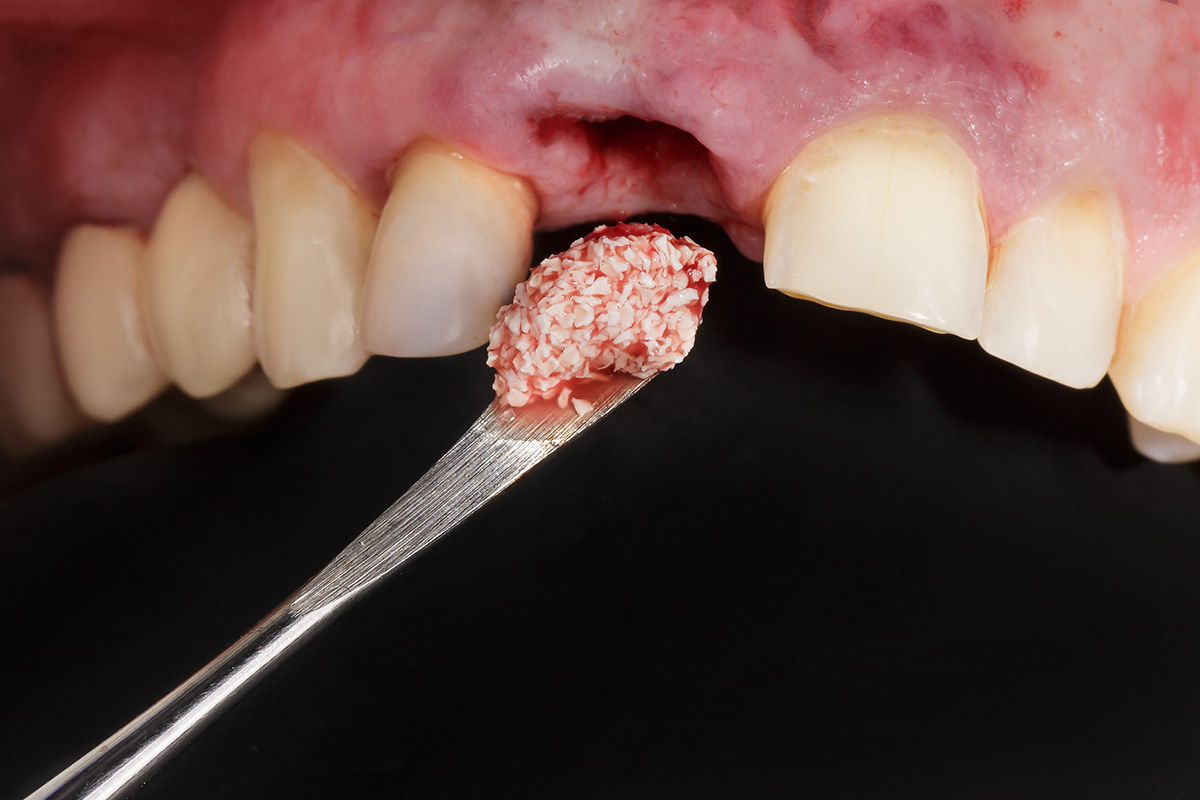
A sinus augmentation also called a sinus lift, is another procedure that is commonly done to make the placement of traditional implants safer. This procedure makes room for more bone by lifting the sinus membrane. The space created or cavity is then filled with a bone powder to integrate within the surrounding tissue. This will take anywhere from 4 to 12 months for the new bone to completely merge with the existing bone.
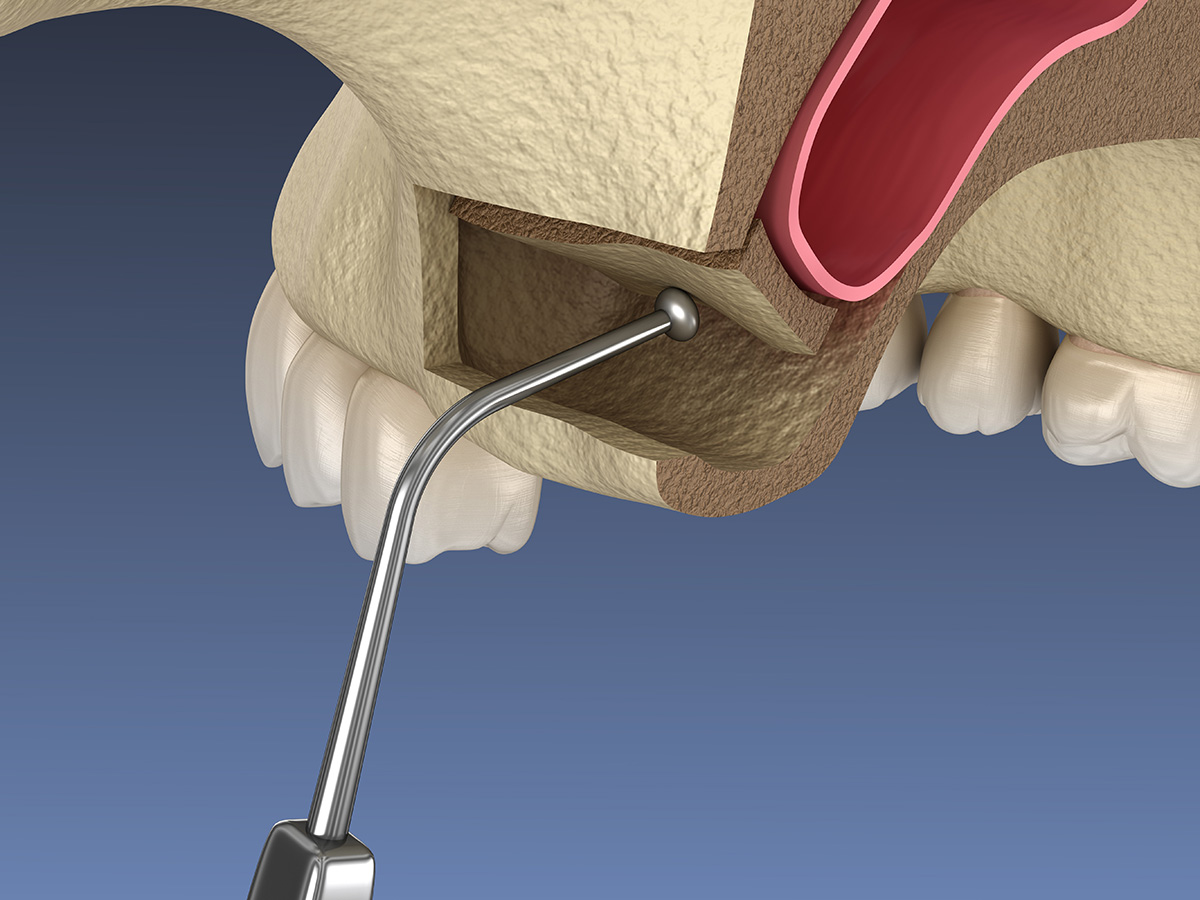
Not all patients will require bone grafting or sinus lifting. These procedures will depend on the health of the bone, which will vary from patient to patient. However, even without these procedures, conventional implant procedures can take up to six months to heal before the final restorative process can take place. Treatment time for All On 4 patients is typically shorter.
Restorative Options
The implants that are placed for either a conventional dental implant or an All-On-4 dental implant act as tooth roots. They are placed to replace the missing tooth roots in the jaw. The next step in the process is then to restore the implant with a prosthetic tooth replacement.
Conventional dental implants can be replaced with either a dental bridge, individual dental crowns, or even dentures. These implants can also be restored with a combination of these restorative options. In contrast, All On 4 dental implants are limited to a full fixed bridge or a denture as the restorative option. All On 4 can not be restored with individual teeth.
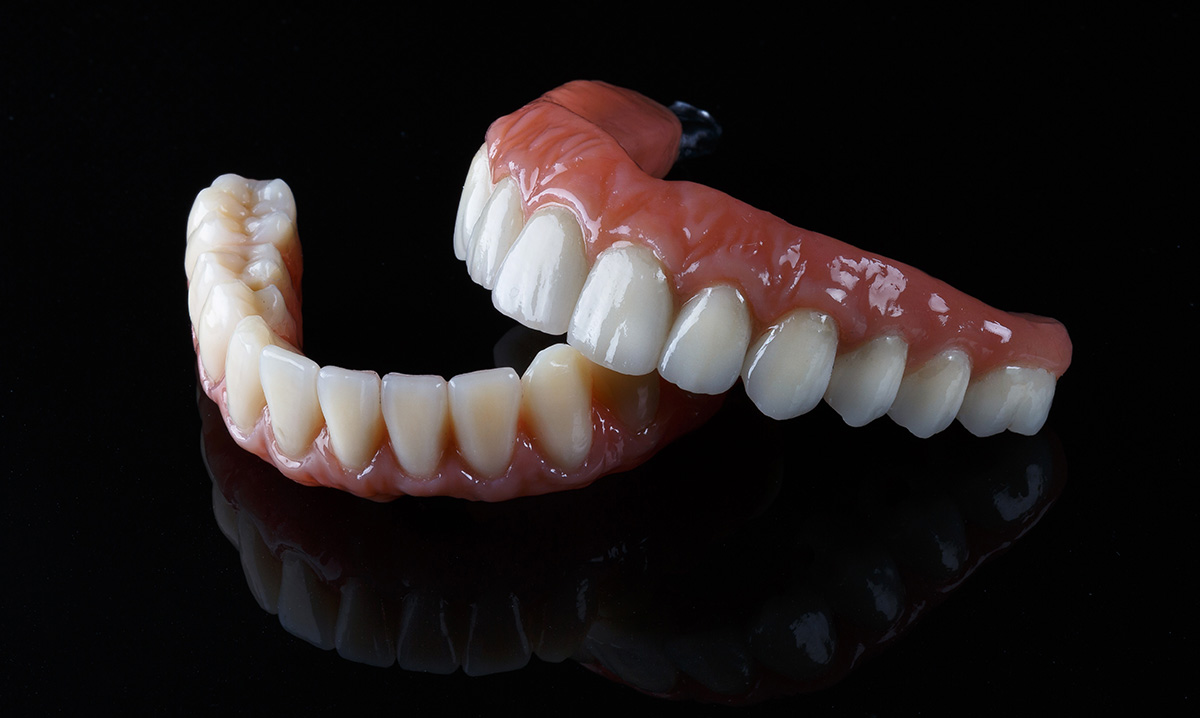
Both conventional dental implants and All-On-4 dental implants provide excellent results when it comes to restoring a person’s dental function. Both procedures provide life-enhancing possibilities. The right treatment option will depend on each individual’s unique situation.
All On 4 Dental Implants vs. Dentures
There has never been a more advanced and life-changing implant dentistry procedure than the All On 4. This technology has impacted many people nationwide due to partial or complete tooth loss. An estimated 23 million people live with total edentulism, which is only expected to increase.
Most people today still opt for dentures when they need a dental restoration, but this isn’t the best solution. With its innovative technology, ease of care, and ability to restore people’s smiles and, in many cases, their lives, the All On 4 dental implant is the ideal solution for total or partial edentulism.
What Is All On 4 Dental Implants?
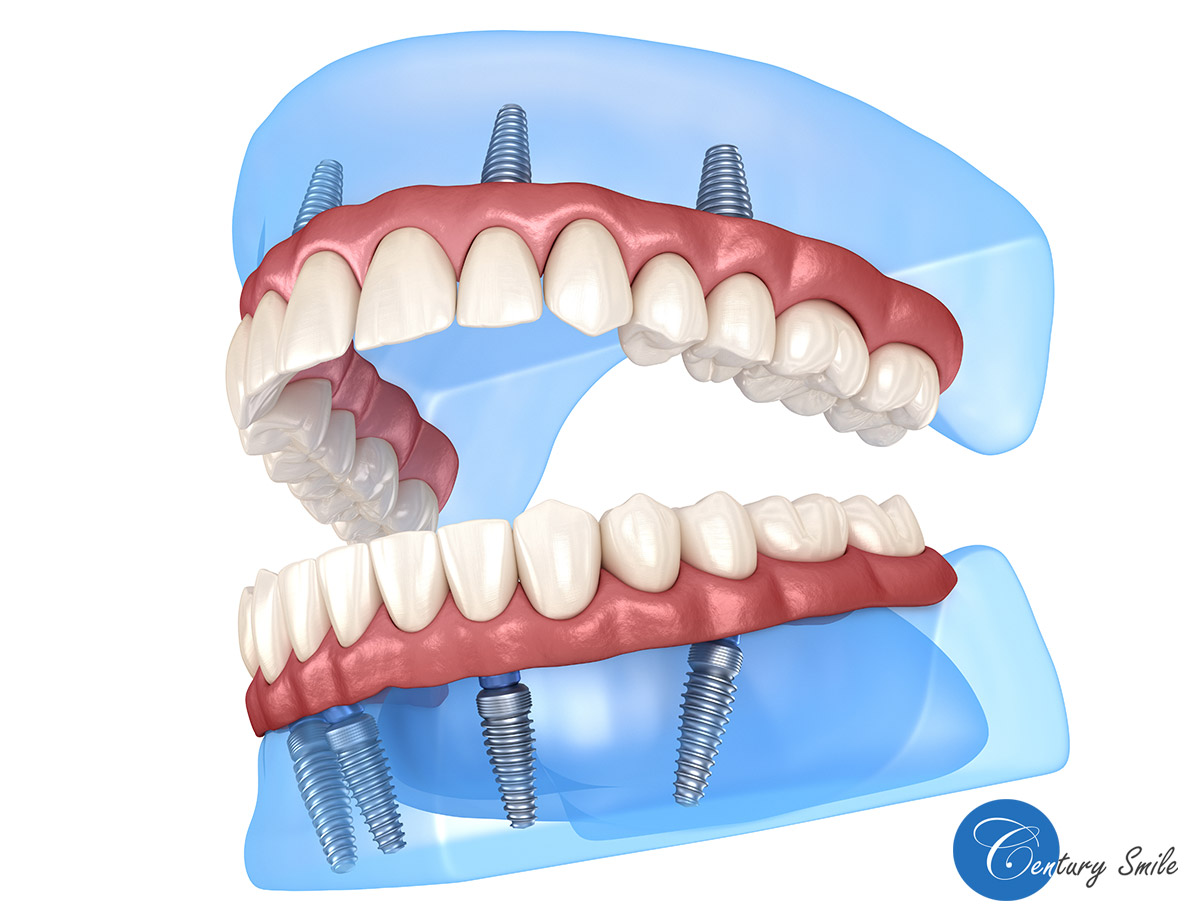
The All On 4 procedure involves replacing an entire arch with a prosthesis supported by at least four dental implants (or more). For example, in a full-mouth rehabilitation, four implants are placed in the lower arch and four in the upper arch. As there are eight implants in total, these full-mouth restorations are typically referred to as All On 8 or All On X.

Unlike conventional implants, this technique requires only one implant for each arch, whereas traditional methods require at least six to eight implants. Having fewer implant sites means that a permanent dental restoration can have a more creative design to create the perfect smile.
Dental Implants or Dentures?
For patients without teeth, dental implants or dentures are the preferred teeth restoration.
Even though dentures are typical among edentulous patients, the All On 4 offers superior benefits in terms of efficacy, esthetics, and maintenance.
Choosing between All On 4 dental implants or dentures for your full-mouth rehabilitation requires understanding all the benefits. Your dentist can also help you figure out your best options.
Differences between All On 4 dental implants and dentures
All On 4 implants are easy to clean and maintain
A dental implant is easier to clean and maintain than a denture, which is one of the most significant differences. Additionally, dentures are removable, whereas dental implants are permanent restorations.
All-On-4 dental implants are surgically screwed into the jaw, which prevents the restoration from moving out of place and trapping food. You are able to perform regular dental hygiene practices at home, such as brushing, flossing, and using mouthwash. Having a restoration in place allows for less stress and maintenance.
Eating is not a concern with dental implants.
Having All On 4 implants will allow you to eat food without removing the restoration and limiting what you eat. Remember, these implants are meant to act like natural teeth and are permanent.
The All On 4 implants allow you to regain all function without any problems.
Dental restorations such as dentures can move out of their place or fall out due to gum recession and bone loss. As a result, there is a greater chance of the denture falling out when eating, talking, smiling, or laughing. This is not the case with All On 4 dental implants which is permanently placed in the jaw, so there is no chance for the implant to fall out or move out of place. Having them enables you to chew, eat, smile, talk, and enjoy your life to the fullest.
A significant reduction in health issues is associated with All On 4 dental implants.
There are several health problems associated with significant tooth loss or complete edentulism. In addition to jaw bone loss and heart disease, the mouth’s health significantly affects many other areas. Dental roots and teeth continuously stimulate the jaw and alveolar bone, preventing decay or breakdown. Due to the absence of teeth, the alveolar bone in the gums begins to deteriorate after receiving a denture. As a result, dentures sit merely on top of the gums. Eventually, the bones will decay completely, and you will need a new denture because the mouth will no longer fit the original one. An All On 4 dental implant provides stimulation for the bone by screwing in a titanium rod that anchors the tooth.
As well as preventing dental health risks, All On 4 implants also prevent gum disease and periodontitis. However, if dentures are not cleaned properly, they can trap food and bacteria, causing gingivitis and periodontitis if left untreated. The same will happen if you don’t follow proper at-home dental care after your dental implant procedure. Diabetes, arthritis, heart disease, and diabetes are all linked to periodontitis.
Are All On 4 dental implants the best option?
For patients experiencing severe decay, broken down teeth, missing teeth, and/or advanced gum disease that will result in complete tooth loss of either the lower or upper jaw or both, All-On-4 is an excellent option to consider. Al On 4 procedures can bring your smile back and improve your ability to chew food properly.
A variety of different reasons causes tooth loss. Everything from accidents, poor dental hygiene, and periodontal disease can result in tooth loss. However, periodontal disease is the leading cause of tooth loss in most adults.
Periodontal disease, also known as gum disease, is an infection of the soft tissue that can cause inflammation, tissue loss, and bone loss. Eventually, if left untreated, this disease can lead to tooth loss. Symptoms of this disease include:
- Bleeding gums
- Swollen, puffy, red gum tissue
- Pus surrounding the teeth at the tissue area
- Bite issues
- Loose teeth
- Bad Breath
If you have experienced any of these, you should seek dental treatments. In addition, proper oral hygiene, including flossing and brushing twice a day and regular dental exams and cleanings, can prevent periodontal disease.
If you have suffered tooth loss and are experiencing severe periodontitis, then All On 4 dental implant treatments may be the best option to bring your mouth back to proper oral function and restore your smile.
The Benefits of All On 4 Dental Implants
- A less expensive option when compared to other dental implant therapies.
- It is an excellent choice over dentures as they are permanent and do not need to be removed for cleaning.
- Chewing abilities are restored
- Long-lasting
- Overall oral health is improved as implant placement helps improve bone health.
- Self-esteem and confidence are improved.
- Your quality of life is improved.
- An excellent option if you do not have enough bone to support other treatment options.
Patients who have lost all or most of their teeth or may need their teeth removed due to gum disease and bone loss will discover that All On 4 dental implants are the best option. This dental implant treatment is an excellent way to replace the upper or lower teeth most cost-effectively. In addition, they require less surgery as there is no need for bone grafts or sinus lifts.
Dentures are often thought of as a solution to tooth loss, and for some, it is the best option. However, dentures will not provide a solution to bone loss. With a denture, your bones will continue to deteriorate, and your denture will continue to need adjusting as it will not fit properly after some time. When thinking about improving the quality of life, All On 4 dental implant treatments offer both an esthetic answer and an overall oral health improvement.
Additional Benefits of All On 4 Dental Implants
Fully-functioning
All On 4 dental implants utilize titanium implants shaped like screws and surgically placed into the jaw bone. Once the implants are placed, a final set of replacement teeth similar in look and feel to natural teeth is placed over the implants.
Because this fixed restoration is essentially screwed into your jaw bone, they do not shift, move, slip, loosen or fall out like a denture most likely would. This means you can eat, talk, laugh and smile without worrying about your teeth moving or falling out.
Eat any food with no reservations
Immediately after your surgical procedure, there is a list of foods to avoid to speed up and ensure your gums heal.
The foods recommended during the healing process are very soft and not heavy foods like yogurt, milkshakes, custards, milk, broth, smoothies, and more. You will soon be able to move into more substantial foods like mashed potatoes, soft tofu, eggs, oatmeal, soft breads, and more. With this being said, once the healing process is up, which can usually take up to 3 months to fully recover, you will be able to enjoy any food with no worry. This includes chewy and tough foods.
Eliminates health issues
Your dental health indirectly affects your overall health in many ways. Therefore, when you are experiencing something like tooth loss, it is essential to seek assistance to fix the issue.
All On 4 dental implants are for patients who have become entirely toothless, have badly broken teeth, whose teeth are decaying rapidly, or for those who are suffering from gum disease. By fixing your dental health with the addition of a fixed prosthesis, you are ultimately eliminating health issues that would have caused more severe health problems.
Easy to take care of
Because All On 4 dental implants are fixed into your jaw bone, they never move or need to be taken out. As a result, you do not have to worry about food getting stuck underneath the teeth or soaking them in a solution at night. Instead, you would care for these implants much like your normal teeth: brushing twice a day, flossing at least once, and using mouthwash.
Cost of All On 4 Dental Implants
There is no denying that All On 4 dental implants are one of the best options for implant therapies. However, while understanding the importance of an All On 4 dental implant, you will want to factor in the benefits gained with the costs. The All On 4 dental implant treatment price most often covers the number of dental implants needed, the set of teeth that goes over the implant, the procedure itself, and the surgical placement of the implants.
All On 4 dental implants may not be as pricey as some believe, considering it is a surgical procedure and is usually covered by dental insurance. The All On 4 concept replaces missing, damaged, and rotting teeth and is designed to restore your smile and help repair any bone loss you may have suffered. The beauty of All On 4 is that the price is not as high as individual dental implants because it requires fewer dental implants. However, it is nearly impossible to quote a specific cost for All On 4 without consultation and understanding the patient’s needs, medical history, and desired features. There is a list of factors I will cover next that influence the price for All On 4 dental implants.
Factors That Influence Price for All On 4 Dental Implants
The Type of Dentist and Practice
One factor that will change the pricing of the All On 4 implant procedure is whether or not you have to go to an out-of-office surgeon for implant installation.
Some general dentists have received additional postgraduate training and education in the different implant therapies. If this is the case, then all of your treatment and appointments will be done under one roof, making the out-of-pocket costs more bearable. Having to go somewhere else may cause there to be additional appointments and extra expenses. This should not be the ultimate deciding factor but is one aspect to consider.
Will you require sedation or anesthesia?
This aspect depends primarily on whether or not you feel like you can sit through an entire procedure or if you want to not remember the whole procedure.
Using nitrous oxide or “laughing gas” is an affordable route, while other medications and anesthetics will require supervision and extreme care. The more intense the anesthetic, the higher the cost goes.
Make sure you speak with your dentist about their options and what they think will be the best for you and your situation.
Implant Restoration Options for All On 4 Dental Implants
The type of implant option chosen will impact the cost of the treatment plan. The following are some implant restoration options you will want to consider regarding quality and price.
All On 4 Acrylic
This implant restoration option is an acrylic denture on top of four implants. Acrylic is the most traditional restoration option and is the most affordable for those seeking the best price as their primary factor.
All On 4 Zirconia
An All On 4 Porcelain implant is made of titanium, CrCo, or a zirconia base and porcelain. This restoration option is the middle ground for implant restoration regarding costs. In addition, it is very strong and durable and has excellent longevity and a natural look and feel.
All On 4 Porcelain
This option is a metal frame with individual porcelain crowns. It is the most expensive, but it can be entirely customized and requires an experienced provider to ensure the look and feel are perfect.
Is a sinus lift needed?
If you are missing your back upper teeth, your sinus lining may have “fallen” into that area, requiring a sinus lift and a bone graft.
A sinus life will ensure that there is enough room to adequately and safely place the implant without causing any issues.
If a sinus lift is needed, this will be an added expense for your final treatment plan.
Is a bone graft needed?
Without proper bone support, your implant will not be able to mount correctly. It is vital that you receive a bone graft procedure to ensure your bone structure is well enough before the final treatment.
A bone graft will greatly impact the cost of your final treatment plan.
Do any teeth need to be extracted?
It is crucial that a dentist never pulls any healthy teeth. You may need to replace them all, or you may not; regardless, your dentist will need to figure out which teeth should be restored. If you do need any teeth extracted, that will require additional procedures and appointments.
The cost of an All On 4 dental implant procedure varies depending on your situation and any additional steps to be taken in the treatment planning.
Because of this, there is no simple answer for the pricing of an All On 4 procedure without considering the many variables that I outlined above. However, a consultation with your dentist will help you figure out the treatment plan and overall costs.





Give Us A Call At 310.836.6161 Or Request An Appointment Online



